UNRS 310: Spiritual Care in Nursing and Faith Integration
VerifiedAdded on 2022/08/19
|6
|1513
|13
Report
AI Summary
This report delves into the crucial role of spiritual care in nursing, particularly within a Christian healthcare setting. The author, a nurse, recounts their experience providing spiritual support to a terminally ill patient with lung cancer, emphasizing the integration of faith-based practices and scripture readings to offer comfort and hope. The report highlights the nurse's personal reflections on engaging their faith in patient care, the impact of this experience on their nursing practice, and the identification of strengths and areas for improvement in providing spiritual care. It also integrates the current beliefs and values of the Christian faith in caring for the sick and dying. The author provides insights into holistic patient care and the importance of understanding a patient's religious background to provide optimal support. References to relevant literature and biblical passages are provided to support the discussion.
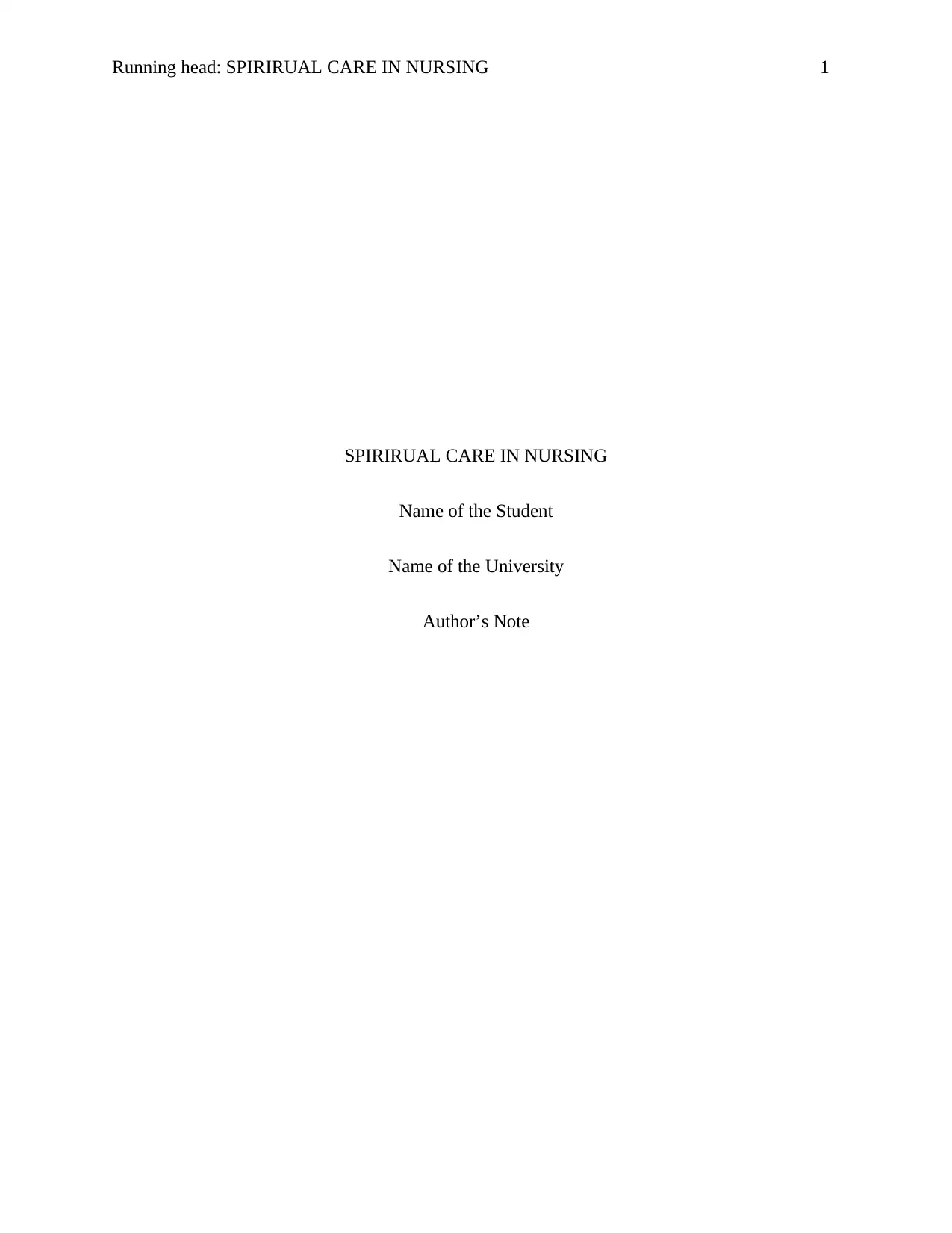
Running head: SPIRIRUAL CARE IN NURSING 1
SPIRIRUAL CARE IN NURSING
Name of the Student
Name of the University
Author’s Note
SPIRIRUAL CARE IN NURSING
Name of the Student
Name of the University
Author’s Note
Paraphrase This Document
Need a fresh take? Get an instant paraphrase of this document with our AI Paraphraser
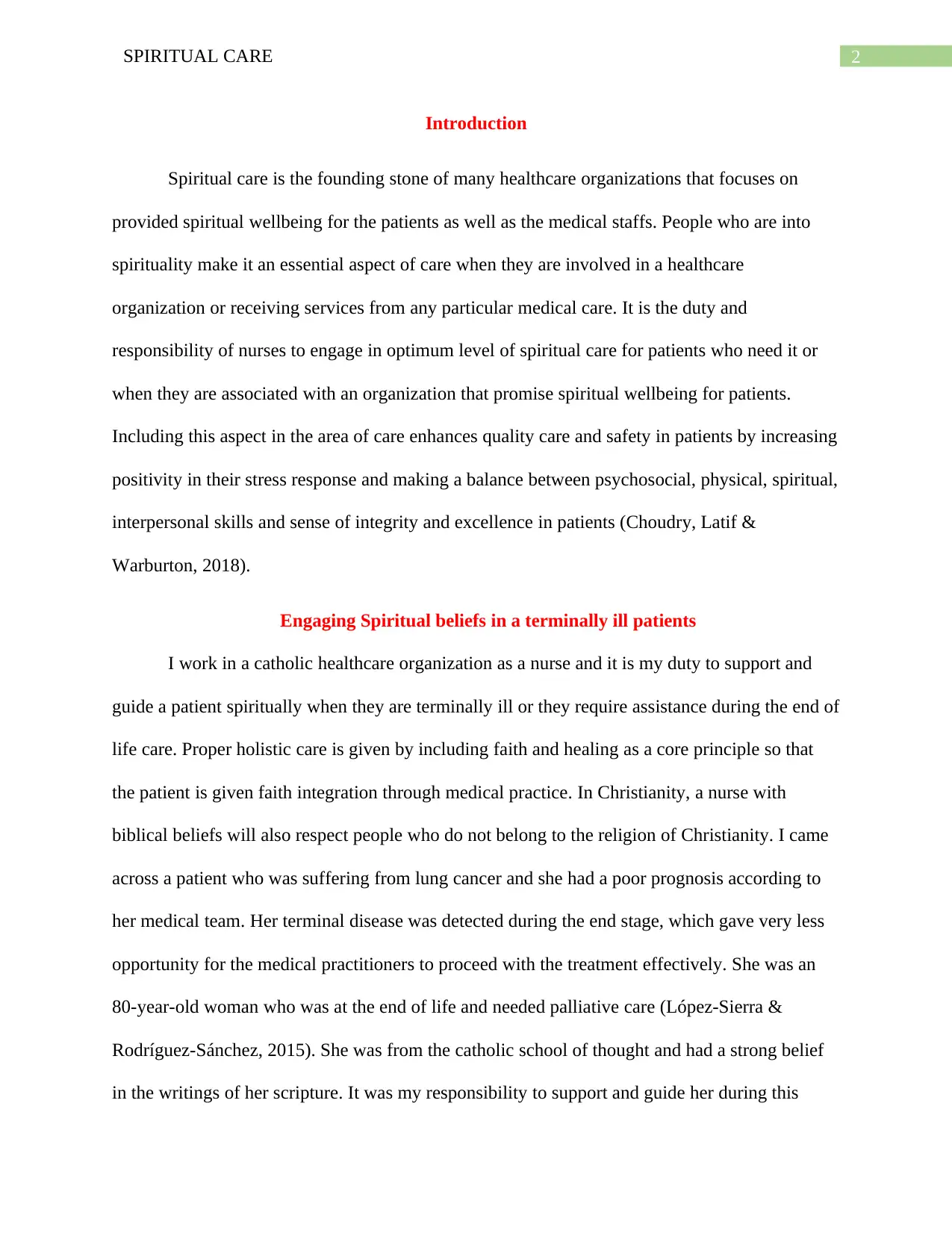
2SPIRITUAL CARE
Introduction
Spiritual care is the founding stone of many healthcare organizations that focuses on
provided spiritual wellbeing for the patients as well as the medical staffs. People who are into
spirituality make it an essential aspect of care when they are involved in a healthcare
organization or receiving services from any particular medical care. It is the duty and
responsibility of nurses to engage in optimum level of spiritual care for patients who need it or
when they are associated with an organization that promise spiritual wellbeing for patients.
Including this aspect in the area of care enhances quality care and safety in patients by increasing
positivity in their stress response and making a balance between psychosocial, physical, spiritual,
interpersonal skills and sense of integrity and excellence in patients (Choudry, Latif &
Warburton, 2018).
Engaging Spiritual beliefs in a terminally ill patients
I work in a catholic healthcare organization as a nurse and it is my duty to support and
guide a patient spiritually when they are terminally ill or they require assistance during the end of
life care. Proper holistic care is given by including faith and healing as a core principle so that
the patient is given faith integration through medical practice. In Christianity, a nurse with
biblical beliefs will also respect people who do not belong to the religion of Christianity. I came
across a patient who was suffering from lung cancer and she had a poor prognosis according to
her medical team. Her terminal disease was detected during the end stage, which gave very less
opportunity for the medical practitioners to proceed with the treatment effectively. She was an
80-year-old woman who was at the end of life and needed palliative care (López-Sierra &
Rodríguez-Sánchez, 2015). She was from the catholic school of thought and had a strong belief
in the writings of her scripture. It was my responsibility to support and guide her during this
Introduction
Spiritual care is the founding stone of many healthcare organizations that focuses on
provided spiritual wellbeing for the patients as well as the medical staffs. People who are into
spirituality make it an essential aspect of care when they are involved in a healthcare
organization or receiving services from any particular medical care. It is the duty and
responsibility of nurses to engage in optimum level of spiritual care for patients who need it or
when they are associated with an organization that promise spiritual wellbeing for patients.
Including this aspect in the area of care enhances quality care and safety in patients by increasing
positivity in their stress response and making a balance between psychosocial, physical, spiritual,
interpersonal skills and sense of integrity and excellence in patients (Choudry, Latif &
Warburton, 2018).
Engaging Spiritual beliefs in a terminally ill patients
I work in a catholic healthcare organization as a nurse and it is my duty to support and
guide a patient spiritually when they are terminally ill or they require assistance during the end of
life care. Proper holistic care is given by including faith and healing as a core principle so that
the patient is given faith integration through medical practice. In Christianity, a nurse with
biblical beliefs will also respect people who do not belong to the religion of Christianity. I came
across a patient who was suffering from lung cancer and she had a poor prognosis according to
her medical team. Her terminal disease was detected during the end stage, which gave very less
opportunity for the medical practitioners to proceed with the treatment effectively. She was an
80-year-old woman who was at the end of life and needed palliative care (López-Sierra &
Rodríguez-Sánchez, 2015). She was from the catholic school of thought and had a strong belief
in the writings of her scripture. It was my responsibility to support and guide her during this
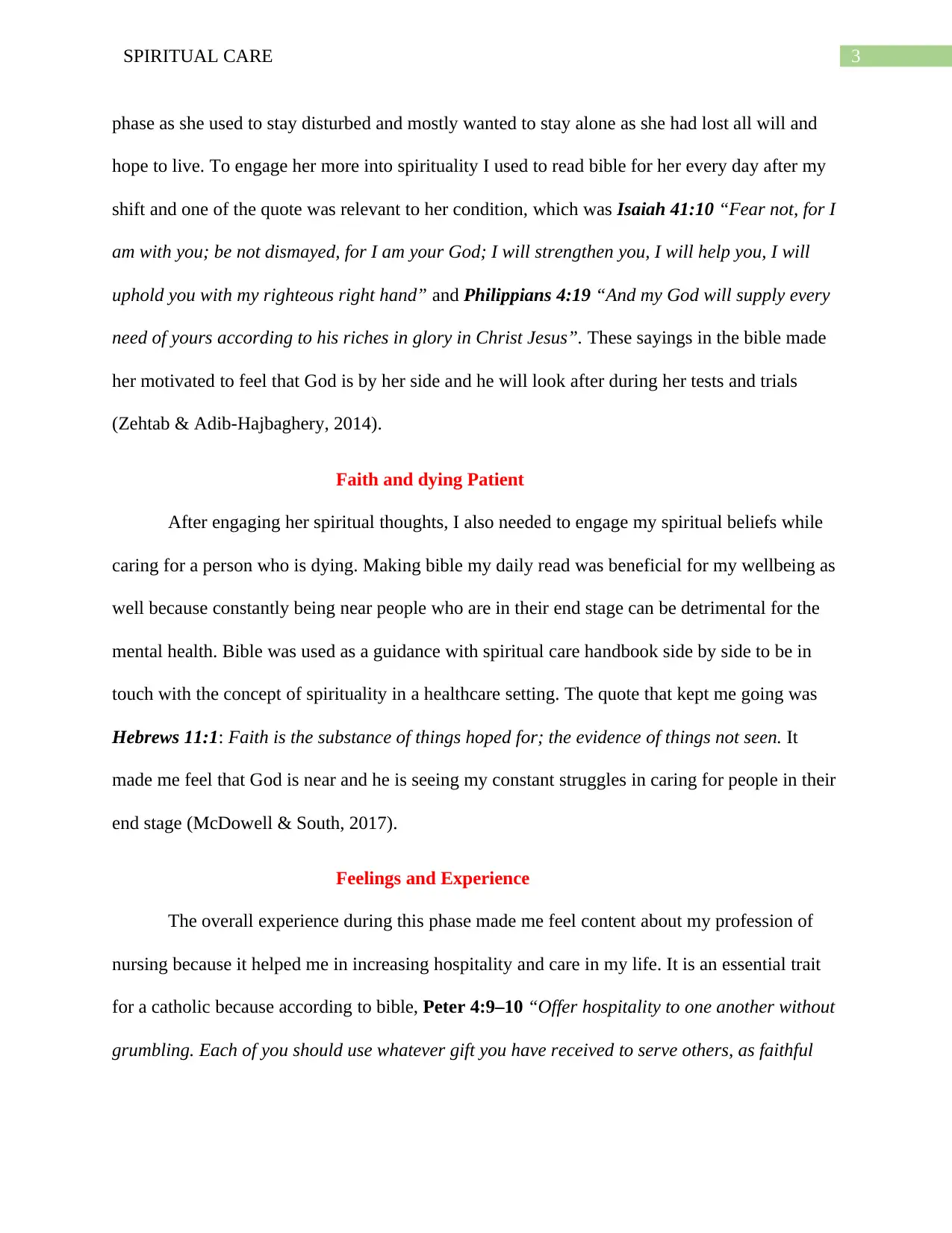
3SPIRITUAL CARE
phase as she used to stay disturbed and mostly wanted to stay alone as she had lost all will and
hope to live. To engage her more into spirituality I used to read bible for her every day after my
shift and one of the quote was relevant to her condition, which was Isaiah 41:10 “Fear not, for I
am with you; be not dismayed, for I am your God; I will strengthen you, I will help you, I will
uphold you with my righteous right hand” and Philippians 4:19 “And my God will supply every
need of yours according to his riches in glory in Christ Jesus”. These sayings in the bible made
her motivated to feel that God is by her side and he will look after during her tests and trials
(Zehtab & Adib-Hajbaghery, 2014).
Faith and dying Patient
After engaging her spiritual thoughts, I also needed to engage my spiritual beliefs while
caring for a person who is dying. Making bible my daily read was beneficial for my wellbeing as
well because constantly being near people who are in their end stage can be detrimental for the
mental health. Bible was used as a guidance with spiritual care handbook side by side to be in
touch with the concept of spirituality in a healthcare setting. The quote that kept me going was
Hebrews 11:1: Faith is the substance of things hoped for; the evidence of things not seen. It
made me feel that God is near and he is seeing my constant struggles in caring for people in their
end stage (McDowell & South, 2017).
Feelings and Experience
The overall experience during this phase made me feel content about my profession of
nursing because it helped me in increasing hospitality and care in my life. It is an essential trait
for a catholic because according to bible, Peter 4:9–10 “Offer hospitality to one another without
grumbling. Each of you should use whatever gift you have received to serve others, as faithful
phase as she used to stay disturbed and mostly wanted to stay alone as she had lost all will and
hope to live. To engage her more into spirituality I used to read bible for her every day after my
shift and one of the quote was relevant to her condition, which was Isaiah 41:10 “Fear not, for I
am with you; be not dismayed, for I am your God; I will strengthen you, I will help you, I will
uphold you with my righteous right hand” and Philippians 4:19 “And my God will supply every
need of yours according to his riches in glory in Christ Jesus”. These sayings in the bible made
her motivated to feel that God is by her side and he will look after during her tests and trials
(Zehtab & Adib-Hajbaghery, 2014).
Faith and dying Patient
After engaging her spiritual thoughts, I also needed to engage my spiritual beliefs while
caring for a person who is dying. Making bible my daily read was beneficial for my wellbeing as
well because constantly being near people who are in their end stage can be detrimental for the
mental health. Bible was used as a guidance with spiritual care handbook side by side to be in
touch with the concept of spirituality in a healthcare setting. The quote that kept me going was
Hebrews 11:1: Faith is the substance of things hoped for; the evidence of things not seen. It
made me feel that God is near and he is seeing my constant struggles in caring for people in their
end stage (McDowell & South, 2017).
Feelings and Experience
The overall experience during this phase made me feel content about my profession of
nursing because it helped me in increasing hospitality and care in my life. It is an essential trait
for a catholic because according to bible, Peter 4:9–10 “Offer hospitality to one another without
grumbling. Each of you should use whatever gift you have received to serve others, as faithful
⊘ This is a preview!⊘
Do you want full access?
Subscribe today to unlock all pages.

Trusted by 1+ million students worldwide
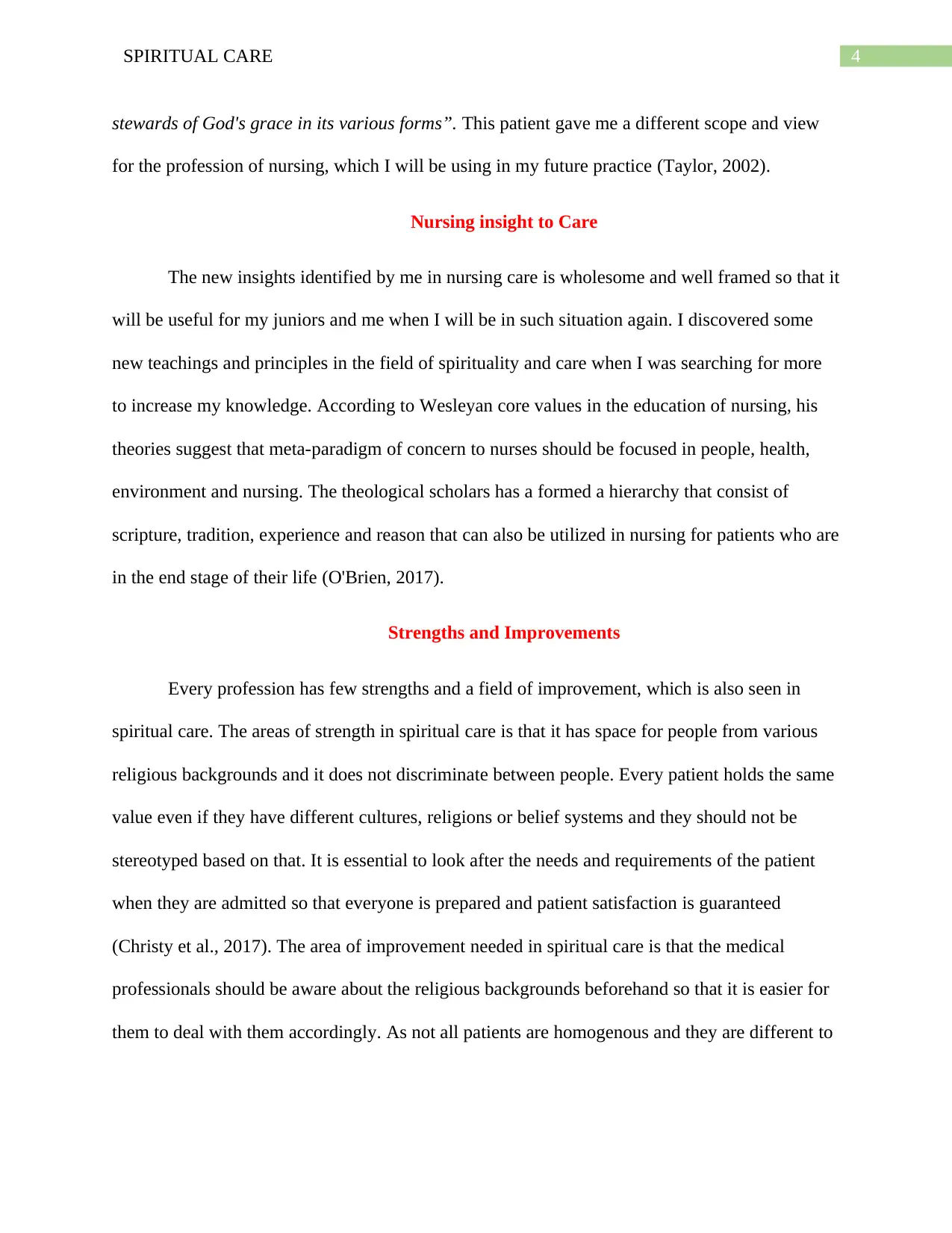
4SPIRITUAL CARE
stewards of God's grace in its various forms”. This patient gave me a different scope and view
for the profession of nursing, which I will be using in my future practice (Taylor, 2002).
Nursing insight to Care
The new insights identified by me in nursing care is wholesome and well framed so that it
will be useful for my juniors and me when I will be in such situation again. I discovered some
new teachings and principles in the field of spirituality and care when I was searching for more
to increase my knowledge. According to Wesleyan core values in the education of nursing, his
theories suggest that meta-paradigm of concern to nurses should be focused in people, health,
environment and nursing. The theological scholars has a formed a hierarchy that consist of
scripture, tradition, experience and reason that can also be utilized in nursing for patients who are
in the end stage of their life (O'Brien, 2017).
Strengths and Improvements
Every profession has few strengths and a field of improvement, which is also seen in
spiritual care. The areas of strength in spiritual care is that it has space for people from various
religious backgrounds and it does not discriminate between people. Every patient holds the same
value even if they have different cultures, religions or belief systems and they should not be
stereotyped based on that. It is essential to look after the needs and requirements of the patient
when they are admitted so that everyone is prepared and patient satisfaction is guaranteed
(Christy et al., 2017). The area of improvement needed in spiritual care is that the medical
professionals should be aware about the religious backgrounds beforehand so that it is easier for
them to deal with them accordingly. As not all patients are homogenous and they are different to
stewards of God's grace in its various forms”. This patient gave me a different scope and view
for the profession of nursing, which I will be using in my future practice (Taylor, 2002).
Nursing insight to Care
The new insights identified by me in nursing care is wholesome and well framed so that it
will be useful for my juniors and me when I will be in such situation again. I discovered some
new teachings and principles in the field of spirituality and care when I was searching for more
to increase my knowledge. According to Wesleyan core values in the education of nursing, his
theories suggest that meta-paradigm of concern to nurses should be focused in people, health,
environment and nursing. The theological scholars has a formed a hierarchy that consist of
scripture, tradition, experience and reason that can also be utilized in nursing for patients who are
in the end stage of their life (O'Brien, 2017).
Strengths and Improvements
Every profession has few strengths and a field of improvement, which is also seen in
spiritual care. The areas of strength in spiritual care is that it has space for people from various
religious backgrounds and it does not discriminate between people. Every patient holds the same
value even if they have different cultures, religions or belief systems and they should not be
stereotyped based on that. It is essential to look after the needs and requirements of the patient
when they are admitted so that everyone is prepared and patient satisfaction is guaranteed
(Christy et al., 2017). The area of improvement needed in spiritual care is that the medical
professionals should be aware about the religious backgrounds beforehand so that it is easier for
them to deal with them accordingly. As not all patients are homogenous and they are different to
Paraphrase This Document
Need a fresh take? Get an instant paraphrase of this document with our AI Paraphraser
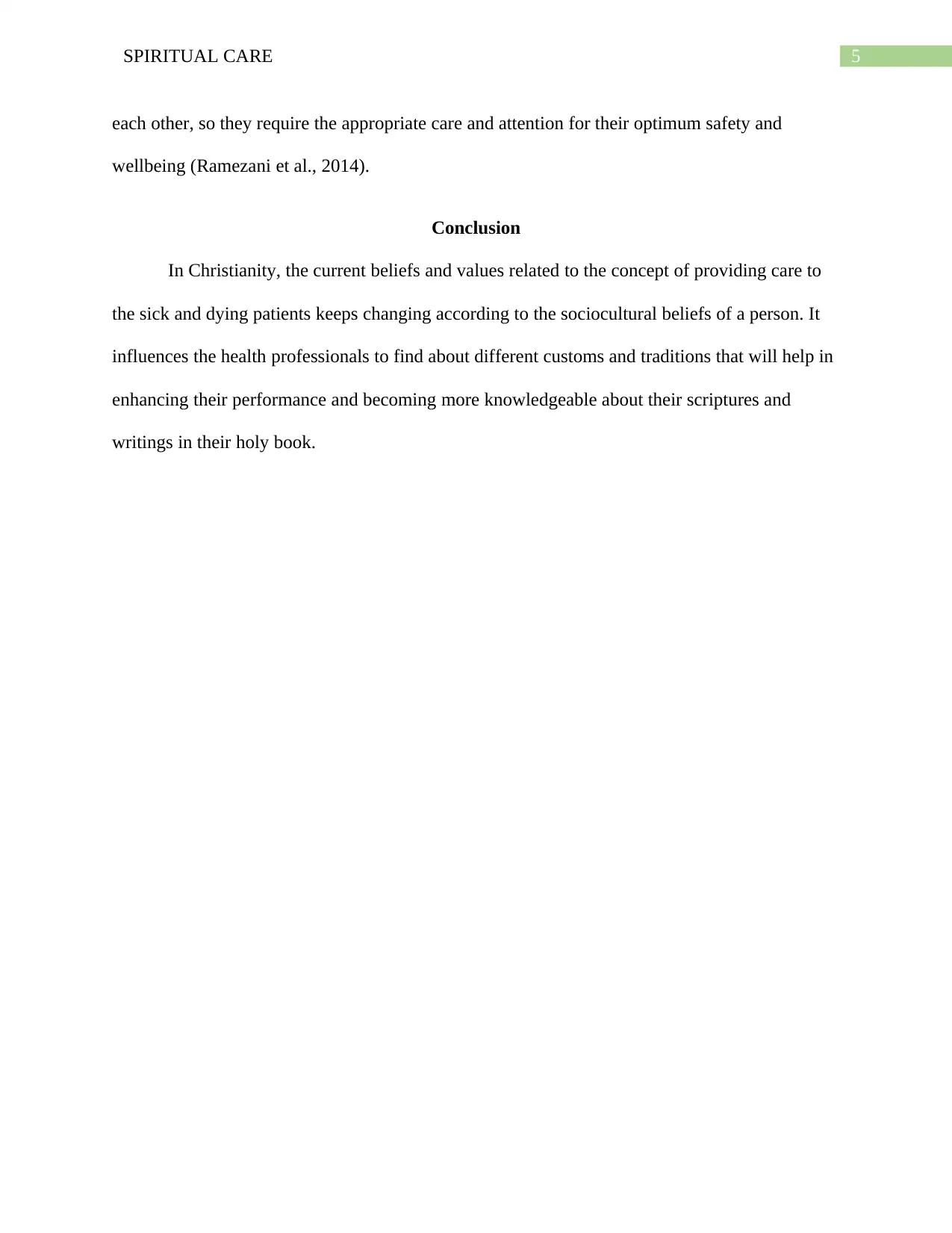
5SPIRITUAL CARE
each other, so they require the appropriate care and attention for their optimum safety and
wellbeing (Ramezani et al., 2014).
Conclusion
In Christianity, the current beliefs and values related to the concept of providing care to
the sick and dying patients keeps changing according to the sociocultural beliefs of a person. It
influences the health professionals to find about different customs and traditions that will help in
enhancing their performance and becoming more knowledgeable about their scriptures and
writings in their holy book.
each other, so they require the appropriate care and attention for their optimum safety and
wellbeing (Ramezani et al., 2014).
Conclusion
In Christianity, the current beliefs and values related to the concept of providing care to
the sick and dying patients keeps changing according to the sociocultural beliefs of a person. It
influences the health professionals to find about different customs and traditions that will help in
enhancing their performance and becoming more knowledgeable about their scriptures and
writings in their holy book.
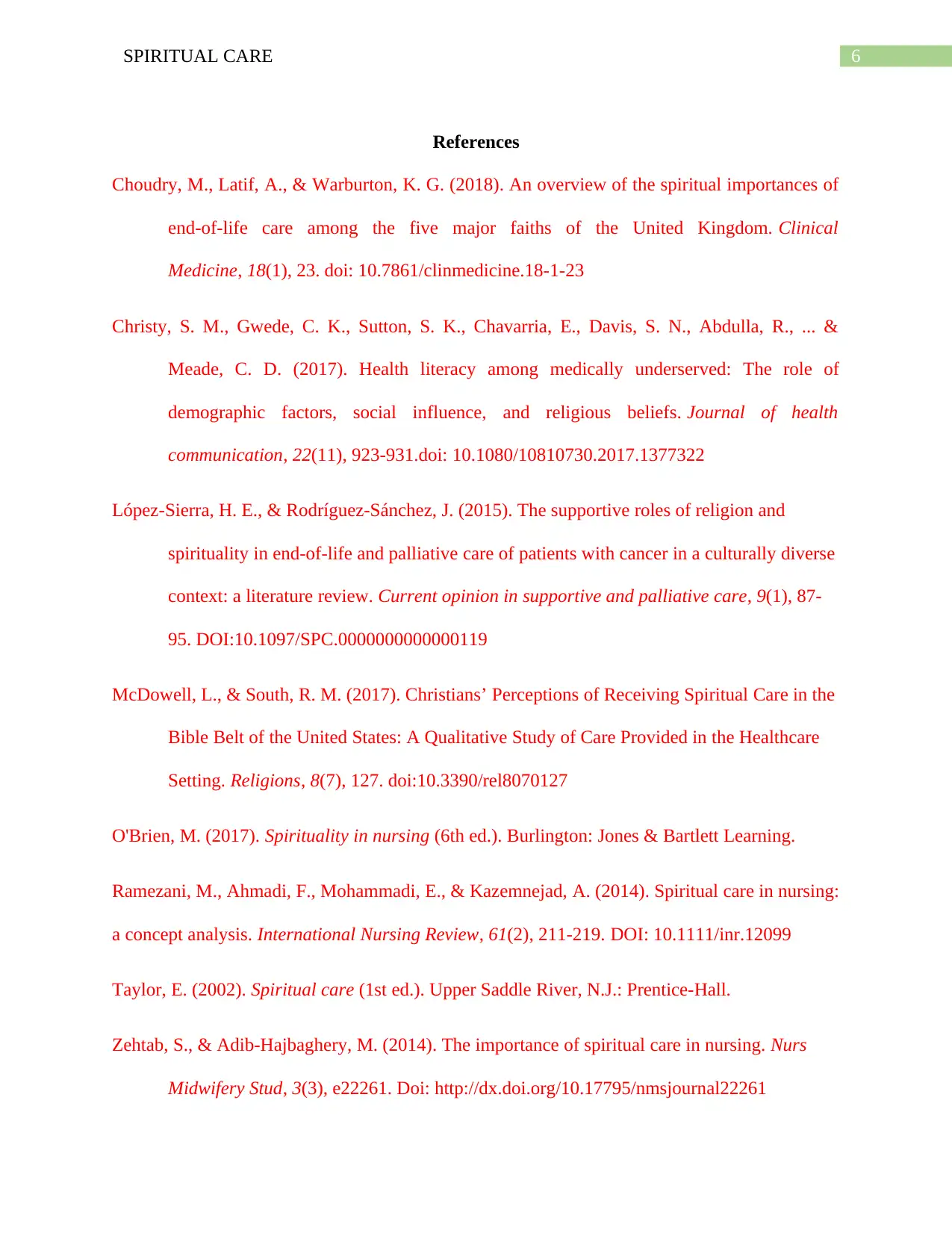
6SPIRITUAL CARE
References
Choudry, M., Latif, A., & Warburton, K. G. (2018). An overview of the spiritual importances of
end-of-life care among the five major faiths of the United Kingdom. Clinical
Medicine, 18(1), 23. doi: 10.7861/clinmedicine.18-1-23
Christy, S. M., Gwede, C. K., Sutton, S. K., Chavarria, E., Davis, S. N., Abdulla, R., ... &
Meade, C. D. (2017). Health literacy among medically underserved: The role of
demographic factors, social influence, and religious beliefs. Journal of health
communication, 22(11), 923-931.doi: 10.1080/10810730.2017.1377322
López-Sierra, H. E., & Rodríguez-Sánchez, J. (2015). The supportive roles of religion and
spirituality in end-of-life and palliative care of patients with cancer in a culturally diverse
context: a literature review. Current opinion in supportive and palliative care, 9(1), 87-
95. DOI:10.1097/SPC.0000000000000119
McDowell, L., & South, R. M. (2017). Christians’ Perceptions of Receiving Spiritual Care in the
Bible Belt of the United States: A Qualitative Study of Care Provided in the Healthcare
Setting. Religions, 8(7), 127. doi:10.3390/rel8070127
O'Brien, M. (2017). Spirituality in nursing (6th ed.). Burlington: Jones & Bartlett Learning.
Ramezani, M., Ahmadi, F., Mohammadi, E., & Kazemnejad, A. (2014). Spiritual care in nursing:
a concept analysis. International Nursing Review, 61(2), 211-219. DOI: 10.1111/inr.12099
Taylor, E. (2002). Spiritual care (1st ed.). Upper Saddle River, N.J.: Prentice-Hall.
Zehtab, S., & Adib-Hajbaghery, M. (2014). The importance of spiritual care in nursing. Nurs
Midwifery Stud, 3(3), e22261. Doi: http://dx.doi.org/10.17795/nmsjournal22261
References
Choudry, M., Latif, A., & Warburton, K. G. (2018). An overview of the spiritual importances of
end-of-life care among the five major faiths of the United Kingdom. Clinical
Medicine, 18(1), 23. doi: 10.7861/clinmedicine.18-1-23
Christy, S. M., Gwede, C. K., Sutton, S. K., Chavarria, E., Davis, S. N., Abdulla, R., ... &
Meade, C. D. (2017). Health literacy among medically underserved: The role of
demographic factors, social influence, and religious beliefs. Journal of health
communication, 22(11), 923-931.doi: 10.1080/10810730.2017.1377322
López-Sierra, H. E., & Rodríguez-Sánchez, J. (2015). The supportive roles of religion and
spirituality in end-of-life and palliative care of patients with cancer in a culturally diverse
context: a literature review. Current opinion in supportive and palliative care, 9(1), 87-
95. DOI:10.1097/SPC.0000000000000119
McDowell, L., & South, R. M. (2017). Christians’ Perceptions of Receiving Spiritual Care in the
Bible Belt of the United States: A Qualitative Study of Care Provided in the Healthcare
Setting. Religions, 8(7), 127. doi:10.3390/rel8070127
O'Brien, M. (2017). Spirituality in nursing (6th ed.). Burlington: Jones & Bartlett Learning.
Ramezani, M., Ahmadi, F., Mohammadi, E., & Kazemnejad, A. (2014). Spiritual care in nursing:
a concept analysis. International Nursing Review, 61(2), 211-219. DOI: 10.1111/inr.12099
Taylor, E. (2002). Spiritual care (1st ed.). Upper Saddle River, N.J.: Prentice-Hall.
Zehtab, S., & Adib-Hajbaghery, M. (2014). The importance of spiritual care in nursing. Nurs
Midwifery Stud, 3(3), e22261. Doi: http://dx.doi.org/10.17795/nmsjournal22261
⊘ This is a preview!⊘
Do you want full access?
Subscribe today to unlock all pages.

Trusted by 1+ million students worldwide
1 out of 6
Related Documents
Your All-in-One AI-Powered Toolkit for Academic Success.
+13062052269
info@desklib.com
Available 24*7 on WhatsApp / Email
![[object Object]](/_next/static/media/star-bottom.7253800d.svg)
Unlock your academic potential
Copyright © 2020–2026 A2Z Services. All Rights Reserved. Developed and managed by ZUCOL.





